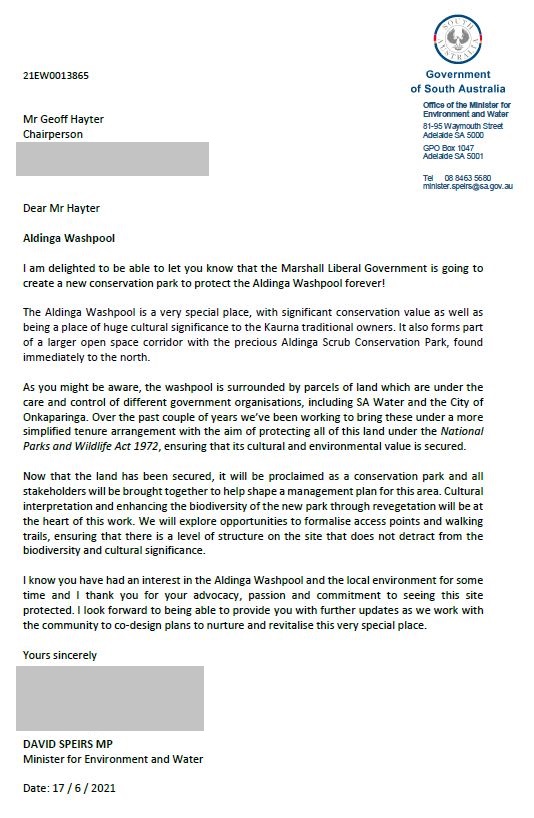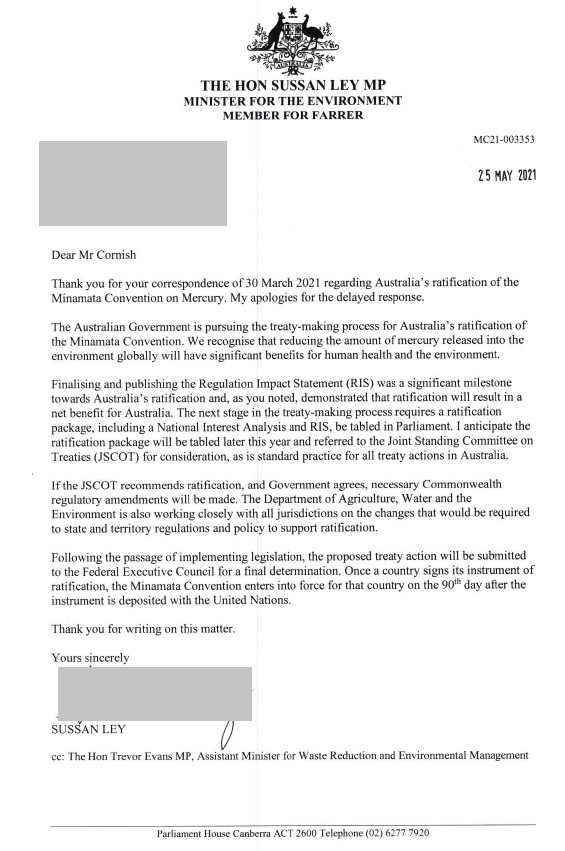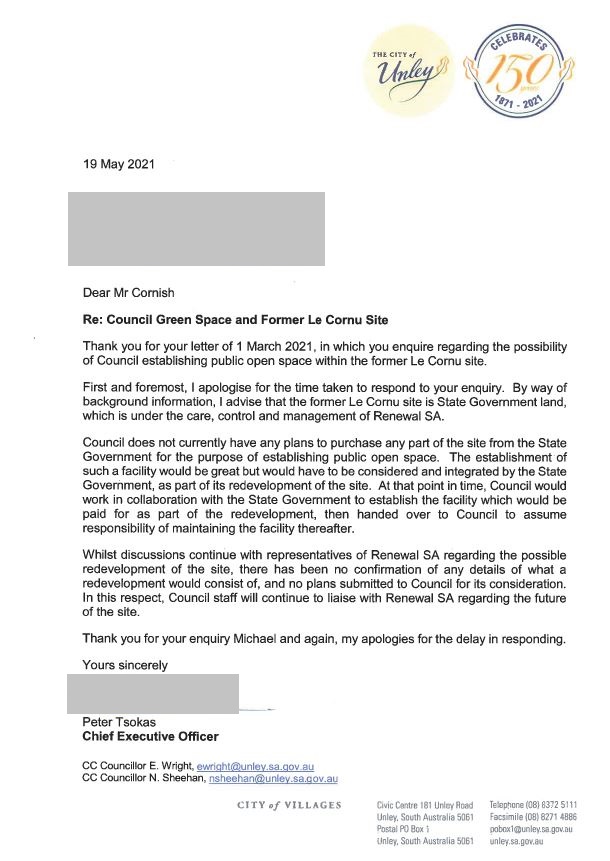Senate Standing Committees on Environment and Communications
PO Box 6100
Parliament House
Canberra ACT 2600
e: [email protected]
Dear Committee
RE: Submission to the EPBC (Standards and Assurance) Bill 2021 inquiry
I write to the Committee as a former Senior Policy Adviser to Ms Rebekha Sharkie MP with carriage of the environment portfolio at the adviser-level for Centre Alliance. This submission is being made wholly in my personal capacity.
Summary of recommendations
Recommendation 1: Consultation process for National Environmental Standards
The bill should include provisions that set out and require a well-defined consultation process when National Environmental Standards are determined, or non-trivially varied. This consultation process should require, at minimum, consultation with Indigenous Australians, the scientific community, environmental stakeholders, business stakeholders, and allow for broader community participation.
Recommendation 2: Enhanced statement of reasons for inconsistent decisions
The bill should require that the statement of reasons provided by the Minister for a decision inconsistent with the National Environmental Standards:
a. refers to the public interest principle or principles which the Minister is relying upon to make that decision; and
b. details the substantive environmental implications of the decision.
Recommendation 3: Commissioner to monitor or audit all (including single) decisions
The Environment Assurance Commissioner should be provided the power to monitor or audit all (including single) Commonwealth decisions under the EPBC Act.
Recommendation 4: Tabling of audit reports
The bill should cause audit reports by the Environment Assurance Commissioner to be tabled in Parliament within an appropriate timeframe after being provided to the Minister.
Recommendation 5: Performance auditing powers
The bill should provide the Environment Assurance Commissioner with performance auditing powers commensurate to the Auditor-General [see: Auditor-General Act 1997 (Cth), Part 4, Division 2].
Analysis
Professor Graeme Samuel’s Final Report of the Independent Review of the Environment Protection and Biodiversity Conservation (‘EPBC’) Act 1999 (‘Final Report’) found that “Australia’s natural environment and iconic places are in an overall state of decline and are under increasing threat. The environment is not sufficiently resilient to withstand current, emerging or future threats, including climate change. The current environmental trajectory is unsustainable.”[1] The projected social and economic damage that will accompany the current environmental trajectory is immense.
The report has 38 recommendations and proposes complete and comprehensive reform. Most critically, this includes new, legally enforceable National Environmental Standards with independent oversight and audit, and facilitating the scale of investment needed to deliver environmental outcomes that actually see an improvement in Australia’s natural environment rather than the current path of terminal decline.
The Environment Protection and Biodiversity Conservation Amendment (Standards and Assurance) Bill 2020 (‘Standards and Assurance Bill’) contends to address but two of those Final Report recommendations, namely, by providing the means to introduce National Environmental Standards by delegated legislation (Recommendation3); and by creating an Environment Assurance Commissioner (Recommendation 23). Whilst it is disappointing that the ambition of the bill is not greater, the two recommendations that the bill addresses are essential elements of desperately urgent environmental reform.
Unfortunately, the bill does not diligently adhere to Professor Samuel’s recommendations.
National Environmental Standards (Schedule 1)
In Recommendation 3 of the Final Report, Professor Samuel stated that “[t]he Commonwealth should make the Standards, and a formal process for doing so should be set out in the EPBC Act. This should include consultation with Indigenous Australians; science, environmental and business stakeholders; and the broader community.” However, this critically important consultation process appears to be absent from the proposed bill.
Recommendation 1: Consultation process for National Environmental Standards
The bill should include provisions that set out and require a well-defined consultation process when National Environmental Standards are determined, or non-trivially varied. This consultation process should require, at minimum, consultation with Indigenous Australians, the scientific community, environmental stakeholders, business stakeholders, and allow for broader community participation.
Recommendation 3 continues: “The Act should include a specific power for the Minister to exercise discretion to make a decision that is inconsistent with the National Environmental Standards. The use of this power should be a rare exception, demonstrably justified in the public interest and accompanied by a published statement of reasons which includes the environmental implications of the decision.”
The bill does provide for this exception, and require a statement of reasons to be provided, but, critically, does require the Minister to include in that statement the public interest they are seeking to rely on in making that inconsistent decision, nor the environmental implications of the decision. In short, under the current construction of the provisions of the bill, the Minister’s discretion is largely unconstrained and insufficiently accountable.
Recommendation 2: Enhanced statement of reasons for inconsistent decisions
The bill should require that the statement of reasons provided by the Minister for a decision inconsistent with the National Environmental Standards:
a. refers to the public interest principle or principles which the Minister is relying upon to make that decision; and
b. details the substantive environmental implications of the decision.
Environment Assurance Commissioner (Schedule 2)
In Recommendation 23 of his Final Report, Professor Samuel states that the Government should: “Immediately establish, by statutory appointment, the position of Environment Assurance Commissioner with responsibility to: (1) oversee audit of decision-making by the Commonwealth under the EPBC Act, including the Office of Compliance and Enforcement…” Yet, amazingly, under section 501C(3), the bill “does not permit the Environment Assurance Commissioner to monitor or audit a single decision.”
Recommendation 3: Commissioner to monitor or audit all (including single) decisions
The Environment Assurance Commissioner should be provided the power to monitor or audit all (including single) Commonwealth decisions under the EPBC Act.
Further, Samuel recommends that audits by the Commissioner be tabled in Federal Parliament, and have performance auditing powers commensurate to those of the Commonwealth Auditor-General. Neither of these prescriptions have been adopted in the bill.
Recommendation 4: Tabling of audit reports
The bill should cause audit reports by the Environment Assurance Commissioner to be tabled in Parliament within an appropriate timeframe after being provided to the Minister.
Recommendation 5: Performance auditing powers
The bill should provide the Environment Assurance Commissioner with performance auditing powers commensurate to the Auditor-General [see: Auditor-General Act 1997 (Cth), Part 4, Division 2].
Conclusion
The bill desperately lacks the ambition outlined in Professor Samuel’s Final Report. It also varies from the detail – and arguably the spirit – of Professor’s Samuel’s two recommendations which it seeks to implement. Professor Samuel himself warned of this concern in his foreword to the Final Report: “Governments should avoid the temptation to cherry pick from a highly interconnected suite of recommendations.”
Ideally the bill would pass with all of the amendments outlined in the recommendations above, with preference being given to recommendations 1, 2b, and 5.
However, in the absence of amendments, and despite its flaws, the bill is still an important step towards urgent environmental reform and should be supported.
It is worth noting that the bill is an apparent response to the Senate crossbench concerns that were aired in response to this bill’s earlier companion, the EPBC Amendment (Streamlining Environmental Approvals) Bill 2020 (‘Streamlining Bill’).
The Standards and Assurance Bill does and should not, in my view, provide enough comfort to the Senate crossbench to support the Streamlining Bill; States should have less power to govern matters of national environmental significance which conflict with vested local economic interests, not more.
This is particularly true for the South Australian Senators who should be exceptionally wary of delegating Federal powers to the executive arms of upstream Murray-Darling States and Territory that are not accountable to South Australian political representation.
When wielded by the Federal executive, decisions regarding upstream Murray-Darling projects in contravention of the EPBC Act or South Australian interests are at least nominally accountable to South Australian representatives in Federal Parliament.
In short, if the passage of the Standards and Assurance Bill becomes conditional upon support for the Streamlining Bill, the Senate crossbench (and Opposition) should not support either bill.
My thanks to the Committee for their consideration of my submission.
Yours sincerely,
Mr Michael Cornish
20 / 3 / 21
[1] p1, Professor Graeme Samuel AC, Independent Review of the EPBC Act – Final Report, October 2020


